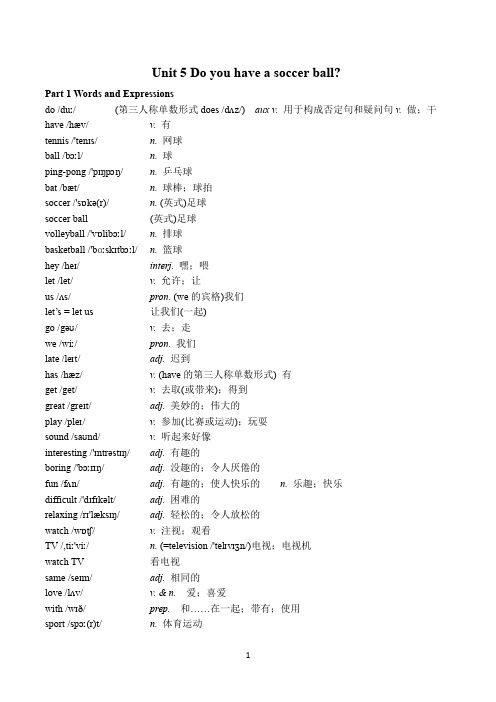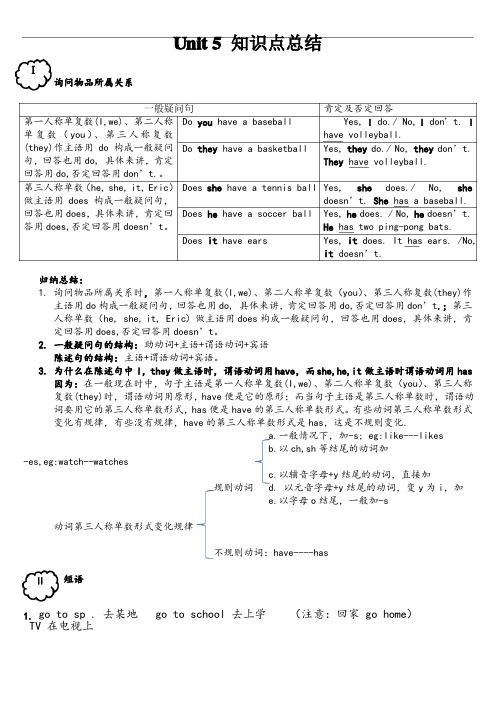七年级英语上册《Unit5Doyouhaveasoccerball》知识点总结人教新目标版
- 格式:pdf
- 大小:37.38 KB
- 文档页数:4

人教版新目标七上英语单元知识点归纳Unit 5 Do you have a soccer ball?重点词汇tennis/'tenis/ n. 网球bat /bæt/ n. 球棒;球拍soccer ball (英式)足球volleyball/'vɔlibɔ:l/ n. 排球basketball/'ba:skitbɔ:l/ n. 篮球late/leit/ adj. 迟到great/greit/ adj. 美妙的;伟大的play/plei/ v. 参加(比赛或运动);玩耍sound/saund/ v. 听起来好像interesting/'intrəstiŋ/ adj. 有趣的boring/'bɔ:riŋ/ adj. 没趣的;令人厌倦的fun/fʌn/ adj. 有趣的;使人快乐的n.乐趣;快乐difficult/'difikəlt/ adj. 困难的relaxing/ri'læksiŋ/ adj. 轻松的;令人放松的watch/wɔtʃ/ v. 注视;观看same/seim/ adj. 相同的easy/'i:zi/ adj. 容易的;不费力的class/kla:s/ n. 班级;课classmate/'kla:smeit/ n. 同班同学重点短语:a tennis bat 一个网球拍play basketball 打篮球baseball bat 棒球棒have a soccer ball 有一个足球play soccer 踢足球with our friends 和我们的朋友一起have a ping-pong ball 有一个乒乓球play ping-pong 打乒乓球have a volleyball 有一个排球play volleyball 打排球at school 在校,上学play sports 做运动watch TV 看电视in my bag 在我的包里be late 迟到on TV 电视上必背典句:1. Do you have a soccer ball? 你有一个足球吗?2. Does he/she have a ping-pong ball?他/她有一个乒乓球吗?3. Do you play sports with your classmates? 你和你的同学一起做运动吗?4. Let’s play soccer together! 我们一起踢足球吧!5. How many sports do you like?你喜欢多少种运动?6. I like playing soccer and basketball. 我喜欢踢足球和打篮球。

人教版英语七年级上册Unit 5 Do you have a soccer ball?.知识点梳理Section A课文要点全解1.tennis ball 网球辨析:tennis ball 与tennis以上两词都可表示“网球”,但意义却完全不同。
[拓展]本单元学到的表示球类运动的名词还有:Soccer(英式)足球volleyball 排球basketball 篮球Ping-pong 乒乓球baseball 棒球2.soccer ball (英式)足球soccer ball 意为“(英式)足球”。
I have a soccer ball. 我有一个足球。
[拓展]football 也可表示“足球”,在英式英语和美式英语中都有;football在美国指橄榄球,也称为American football。
football 是国际上对足球的普遍称呼,各种国际足球组织的官方称呼中也用football。
3.Do you have a ping-pong bat?你有一个乒乓球拍吗?(1)这是一般现在时的一般疑问句,句中的谓语动词have 是一个实义动词。
在英语中,句子的谓语动词如果是实义动词,变为一般疑问句时,要借助于助动词do/does来提问。
其基本句式为:Do/Does+主语+实义动词原型+其他?主语为第三人称单数时用Does,其他情况用do。
Do和does在这里没有实际意义,只是用来帮助构成一般疑问句。
I know Mr.Wang. 我认识王先生。
Do you know Mr.Wang? 你认识王先生吗?He has a baseball. 他有一个棒球。
Does he have a baseball? 他有一个棒球吗?[拓展]一般疑问句的肯定回答为“Yes, 主语(代词)+do/does.”,否定回答为“No, 主语(代词)+don’t/doesn’t.”。
-Does Tim go to school on foot? 蒂姆步行去上学吗?-Yes, he does./No, he doesn’t. 是的,他步行。

Unit5 Do you have a soccer ball?知识点归纳一、重点短语句型1.- Do you have a soccer ball? 你有一个足球吗?-Yes, I do./ No, I don't. 有,我有。
/不,我没有。
2.- Does she have a tennis ball? 她有一个网球吗?-Yes,she does./ No, she doesn't有,她有。
/不,她没有。
3.I have a volleyball./ I don ’t have a volleyball.我有 /没有一个排球。
4. He has two ping-pong bats. 他有两个乒乓球拍。
He doesn’t have two ping-pong bats. 他没有两个乒乓球拍。
5.let’s = let us + do sth 让我们做某事Let’s go. 让我们走。
Let me get it. 我去拿它。
6.play basketball 打篮球/ play volleyball 打排球 /play soccer 踢足球 /play ping-pong 打乒乓球 /play baseball 打棒球 /play tennis 打网球 /play computer games 打电子游戏7.We’re late. 我们要迟到了。
be late 迟到8.That sounds good. 那听起来很不错。
That sounds interesting/fun/relaxing/boring/difficult. 那听起来很有趣 /放松 /无聊 /困难。
9.watch TV 看电视10.play sports with our classmates 和我的同学做运动11.go to the same school 去同一间学校上学。
12.at school 在学校13.only watch them on TV 只在电视上看它们14.It ’s adj(形容词) for sb.对某人来时怎么样。

Unit 5 Do you have a soccer ball?Part 1 Words and Expressionsdo /duː/ (第三人称单数形式does /dʌz/) aux v.用于构成否定句和疑问句v.做;干have /hæv/ v.有tennis /'tenɪs/ n. 网球ball /bɔːl/ n.球ping-pong /'pɪŋpɔŋ/ n. 乒乓球bat /bæt/ n. 球棒;球拍soccer /'sɒkə(r)/ n. (英式)足球soccer ball (英式)足球volleyball /'vɒlibɔːl/ n.排球basketball /'bɑːskɪtbɔːl/ n.篮球hey /heɪ/ interj.嘿;喂let /let/ v. 允许;让us /ʌs/ pron. (we的宾格)我们let’s = let us 让我们(一起)go /gəʊ/ v.去;走we /wiː/ pron.我们late /leɪt/ adj. 迟到has /hæz/ v. (have的第三人称单数形式) 有get /get/ v.去取(或带来);得到great /greɪt/ adj.美妙的;伟大的play /pleɪ/ v. 参加(比赛或运动);玩耍sound /saʊnd/ v.听起来好像interesting /'ɪntrəstɪŋ/ adj.有趣的boring /'bɔːrɪŋ/adj.没趣的;令人厌倦的fun /fʌn/ adj.有趣的;使人快乐的n.乐趣;快乐difficult /'dɪfɪkəlt/ adj. 困难的relaxing /rɪ'læksɪŋ/ adj.轻松的;令人放松的watch /wɒtʃ/ v.注视;观看TV /,tiː'viː/ n. (=television /'telɪvɪʒn/)电视;电视机watch TV看电视same /seɪm/ adj. 相同的love /lʌv/ v. & n. 爱;喜爱with /wɪð/ prep.和……在一起;带有;使用sport /spɔː(r)t/ n. 体育运动them /ðəm/ pron. (they的宾格) 他(她、它)们only /'əʊnli/ adv.只;仅like /laɪk/ v. 喜欢;喜爱easy /'iːzi/ adj.容易的;不费力的after /'ɑːftə(r)/prep. & conj.在……之后class /klɑːs/ n.班级;课classmate /'klɑːsmeɪt/ n.同班同学Bill /bɪl/比尔(男名)Part 2:Texts课文(一)Cindy:Hey, Helen, let’s go! We’re late!Helen: OK.Cindy: Do you have the baseball?Helen: Yes, I do. It’s in my bag.Cindy: And where’s our baseball bat?Helen: Bill has it.Cindy: Oh, yeah. And do you have your jacket?Helen: Oh, no, I don’t. It’s on the chair. Let me get it. Cindy: And your hat, too!Helen: OK, I have my jacket and hat. Let’s go!Structure1. Do you have a baseball?Yes, I do./No, I don’t. I have a volleyball.2. Do you have a ping-pong bat?Yes, I do./No, I don’t. I have a ping-pong ball.3. Does she have a tennis ball?Yes, she does./No, she doesn’t. She has a baseball.4. Does he have a soccer ball?Yes, he does./No. he doesn’t. He has two ping-pong bats. 5. Do they have a basketball?句型:—Do/Does sb. have…?—Yes, sb. do / does.—No, sb. don’t / doesn’t.Write each word in the correct place in the chart.将方框中的单词填入表格中正确的位置。

Unit 5知识点总结Ⅰ询问物品所属关系一般疑问句第一人称单复数(I,we)、第二人称Do you have a baseball单复数(you)、第三人称复数(they)作主语用do构成一般疑问Do they have a basketball 句,回答也用do,具体来讲,肯定回答用do,否定回答用don’t.。
第三人称单数(he,she,it,Eric)Does she have a tennis ball 做主语用does构成一般疑问句,回答也用does,具体来讲,肯定回Does he have a soccer ball 答用does,否定回答用doesn’t。
Does it have ears 肯定及否定回答Yes,I do./ No,I don’t. I have volleyball.Yes,they do./No,they don’t. They have volleyball.Yes,she does./No,she doesn’t.She has a baseball. Yes,he does./No,he doesn’t. He has two ping-pong bats. Yes,it does. It has ears. /No, it doesn’t.归纳总结:1.询问物品所属关系时,第一人称单复数(I,we)、第二人称单复数(you)、第三人称复数(they)作主语用do构成一般疑问句,回答也用do,具体来讲,肯定回答用do,否定回答用don’t.;第三人称单数(he, she,it, Eric)做主语用does构成一般疑问句,回答也用does,具体来讲,肯定回答用does,否定回答用doesn’t。
2.一般疑问句的结构:助动词+主语+谓语动词+宾语陈述句的结构:主语+谓语动词+宾语。
3.为什么在陈述句中I,they做主语时,谓语动词用have,而she,he,it做主语时谓语动词用has因为:在一般现在时中,句子主语是第一人称单复数(I,we)、第二人称单复数(you)、第三人称复数(they)时,谓语动词用原形,have便是它的原形;而当句子主语是第三人称单数时,谓语动词要用它的第三人称单数形式,has便是have的第三人称单数形式。

Unit 5 Do you have a soccer ball?一、词汇与短语● 重点单词A部分1.have v. 有2.has v. (have的第三人称单数形式)有3.ball n. 球te adj. 迟到5.ping-pong n. 乒乓球6.tennis n. 网球7.soccer n. (英式)足球8.get v. 去取(或带来);得到9.volleyball n. 排球10.great adj. 美妙的;伟大的11.basketball n. 篮球12.play v. 参加(比赛或运动);玩耍13.let v. 允许;让14.sound v. 听起来好像 pron. (we的宾格)我们16.bat n. 球棒;球拍17.go v. 去;走18.hey interj. 嘿;喂19.we pron. 我们20.do (第三人称单数形式does)aux v.&v.用于构成否定句和疑问句;做;干B部分1.interesting adj. 有趣的2.boring adj. 没趣的;令人厌倦的3.fun adj.有趣的;使人快乐的n. 乐趣;快乐4.difficult adj. 困难的5.relaxing adj. 轻松的;令人放松的6.watch v. 注视;观看 n.(= television)电视;电视机8.same adj. 相同的9.love v.&n. 爱;喜爱10.sport n. 体育运动11.with prep. 和……在一起;带有;使用12.only adv. 只;仅13.them pron. (they的宾格) 他(她、它)们14.like v. 喜欢;喜爱15.easy adj. 容易的;不费力的16.after prep.&conj. 在……以后17.class n. 班级;课18.classmate n. 同班同学● 重点短语A部分1.a ping-pong bat 一个乒乓球拍2.a baseball bat 一个棒球棒3.play basketball 打篮球4.sounds good 听起来不错5.be late 迟到6.play tennis 打网球7.play volleyball 打排球8.play soccer 踢足球9.play ping-pong 打乒乓球B部分1.play computer games 玩电脑游戏2.play volleyball 打排球3.go to the same school 上同一所学校4.watch TV 看电视5.sound interesting 听起来很有趣6.at school 在学校7.with them 和他们一起8.with our friends 和我们的朋友9.watch them on TV 在电视上看它们10.after class 下课后11.watch sports 看体育运动12.in the same school 在同一所学校13.play sth. with sb. 和某人玩某物14.love sports 喜爱运动● 重点句子A部分1.--Do you have a ping-pong bat? --No, I don't.你有一个乒乓球拍吗?不,我没有。
Unit 5. Do you have a soccer ball语法专项一般现在时态中have的用法教材典句:1.Do you have a ping-pong bat Yes, I do .你有一个兵乓球吗?是的,我有。
2.Does he have a soccer ball 他有一个足球吗Yes, he does ./ No, he doesn’t . 是的,他有。
/ 不,他没有。
3.I don’t have a soccer ball ..... 我没有足球.....句1、句2是含有实义动词have的一般疑问句,句3是含有实义动词have的否认句。
下面让我们来学习一下have的具体用法吧!语法全解:1.用法:have意为“有〞表示所属关系,其主语一般是人,强调某人拥有某物,有时也可以用作主语。
一般现在时,当主语是第三人称单数形式时,谓语动词用has,其他人称时,谓语动词都用have。
People have their own hobbies. 人们都有自己的业余爱好。
Tom has three pens . 汤姆有3支钢笔。
助记:have的用法动词have表示“有〞位置就在主语后;“三单〞主语用has, 其他人称用have。
一般疑问句很好变,句首直接把do/ does 添;否认句子也容易,don’t/ doesn’t 加在have/ has前;does/ doesn’t 句中现,has要用have来替换。
2.句式⑴. 肯定句:主语+have/ has+......I have an eraser. 我有一块橡皮。
He has a soccer . 他有一个足球。
⑵. 否认句:主语+don’t/ doesn’t +have ......I don’t have an eraser. 我没有橡皮。
He doesn’t have a tennis racket . 他没有网球拍。
⑶. 一般疑问句:Do/ Does+主语+have....肯定答语:Yes, 主语+do/ does否认答语:No, 主语+don’t/ doesn’tDo you have a bike 你有自行车吗?Yes, I do. / No, I don’t . 是的,我有。
Unit 5 Do you have a soccer ball?△词汇:1.球类名词小结soccer ball英式足球ping-pong ball乒乓球tennis网球volleyball 排球basketball篮球2.“球拍”的表达tennis racket网球拍ping-pong bat乒乓球拍3.play + 名词结构的短语play sports参加体育运动play computer games玩电脑游戏4.“play + 球类名词”结构的短语play ping-pong ball打乒乓球play tennis 打网球play soccer踢足球play volleyball打排球5. sports club 体育俱乐部Sport“运动”,修饰名词时,总是用复数形式。
sports meeting运动会sports shoes运动鞋6.play/do sports做运动7.watch TV看电视on TV在电视上,通过电视8.on TV/on the radio/on the computer/on the phone在电视上/在收音机上/在电脑上/在电话上电子产品上用介词on。
9.常用的描述某物或某事的形容词:interesting有趣的fun有趣的relaxing轻松的boring无聊的difficult困难的10.have a great sports collection有大量的体育收藏品11.every day 每天She plays sports every day. 她每天都做运动。
everyday日常的everyday English 日常英语12.after class 下课后after school 放学后13. It’s easy for me.这对我来说挺容易的。
14. We’re late! 我们迟到了!be late for…. ……迟到Don’t be late for school.不要上学迟到。
七年级英语上册Unit5 Do you have a soccer ball?知识点全面讲解与练习一.必背重点单词和词组:interesting有趣的, boring无聊的, difficult困难的, fun令人愉快的, relaxing轻松的,easy容易的。
这些形容词主要用在名词前面做定语或系动词后面做表语。
This is an interesting book. 这是一本有趣的书。
It’s difficult. 它很难。
tennis ball ping-pong bat ping-pong ball soccer ball baseball bat watch TVat school after class love sports play basketball on TV二.have和has的用法在英语中表示某人拥有某物要有have或has。
Have用于第一人称、第二人称、第三人称复数或其他复数名词。
has用于第三人称单数。
(1)含有have的肯定句变为否定句,要在主语后,实义动词have前加助动词don’t。
含有has 的肯定句变为否定句时要在主语后,实义动词has前加doesn’t,动词has还原为have。
如:I have a baseball bat. 我有一个棒球棒。
→I don’t have a baseball bat.我没有棒球棒。
He has a computer. 他有一台电脑。
→ He doesn’t have a computer.他没有电脑。
(2)含有have的肯定句变为一般疑问句,直接在句前面加Do即可。
含有has的肯定句变为一般疑问句,要在句子前面加Does,动词has 还原为have。
如:They have a room.→ Do they have a room? She has a sister. → Does she have a sister?三.人称代词(小结):表示“我”、“你”、“他”、“她”、“我们”、“你们”、“他们”的词,叫人称代词。
Unit 5 Do you have a soccer ball?1.短语归纳:soccer ball 英式足球 a tennis bat 一个网球拍 baseball bat 棒球棒play basketball 打篮球 play sports 参加体育运动或比赛 in my bag 在我的包里watch TV 看电视 on TV 电视上 be late 迟到2.一般现在时态中have的用法have意为“有”,表示所属关系,有人称和数的变化,其主语一般是人,有时也可以是物。
(1)have用于复数名词、第一、二人称单复数或第三人称复数代词作主语的句子中;has为have的第三人称单数形式,用于不可数名词、可数名词或第三人称单数代词作主语的句子中。
例:I have a pen. 我有一支钢笔。
(2) have / has的一般疑问句:在句首加助动词do或does,句尾加问号构成。
除第三人称单数用does外,其余都用do.第三人称前加does后,have / has作谓语时,句中的谓语动词has要变成have。
例:He has a pen. 他有一个钢笔。
(3) 否定句式:主语+don’t / doesn’t +have…I don’t have an eraser. 我没有橡皮。
He doesn’t have an eraser. 他没有橡皮。
(4)一般疑问句式:Do/ Does+主语+have…Does he have a cup? 他有一个茶杯吗?肯定答语:Yes,主语+do / does.否定答语:No, 主语+don’t / doesn’t.(5)当have / has后的名词被some修饰时,在否定句和疑问句中some要变成any.I have some good friend.→I don’t have any good friend.3.Let’s=Let us 让我们……吧。
4.That sounds good.主语+系动词+表语5.play+the+乐器,play+球类运动名词Section B (3a-Self Check)一、教学目标:1. 语言知识目标:1) 继续练习运用如何订餐或叫外卖等的用语。
Unit 5 Do you have a soccer ball?1. Do you have......? Yes, I do. No, I don’t..你有,,吗?是的,我有。
不,我没有。
Do they have......? Yes, they do. No, they don’t..Does he have......? Yes, he does. No, he doesn’t.Does she ha ve......? Yes, she does. No, she doesn’t.在一般现在时中,句子的谓语动词若是实义动词,常借助助动词do或does来构成否定句或疑问句。
Does用于主语是第三人称单数的句子中,其他情况用do。
2. do/does1)作助动词,帮助构成一般现在时的否定句或疑问句,无意义。
Do you have a soccer ball? 你有足球吗?I don’t know. 我不知道。
Does Jim have a sister? 吉姆有妹妹吗?What does he like? 他喜欢什么?He doesn’t like English. 他不喜欢英语。
2) 作实义动词,“做,干”。
I do my homework every day. 我每天都做家庭作业。
Bob does his homework every day. 鲍勃每天都做家庭作业。
3) 在一般现在时中,do/does 可用来替代上文出现过的动词,以避免重复。
Do you have a soccer ball? 你有足球吗?Yes, I do. 是的,我有。
(do 代have)Does she have an eraser? Yes, she does.I don’t have a soccer ball, but my brother Alan d oes.我没有足球,但我的哥哥艾伦有。
3.Let’s do sth. “(让)我们做某事吧。
”表示建议。
(let’s = let us)肯定回答一般用That sounds good.(那听起来很好)/OK.好的 / All right.好的 / Great.好极了/ Good idea. 好主意否定回答一般用sorry, I...1) 让我们上学去吧。
好的。
2)我们打乒乓球吧。
对不起,我有许多家庭作业要做。
4. let sb. do sth. 让某人作某事1)让他踢足球。
2)让海伦回家吧5. We’re late! 我们迟到了!be late for,. ,,迟到 Don’t be late for school.不要上学迟到。
6. play + 球类名词:打/踢,,球(注意:球类运动不用冠词)play ping-pong/basketball/volleyball/tennis/soccer7. sound1)连系动词,“听起来”,后接形容词作表语。
That story sounds very interesting.那故事听起来很有趣。
2)名词“声音”(泛指自然界中的各种声音)。
The sound is too loud.声音太大了。
8. We play it at school with our friends.我们和我们的朋友在学校踢。
1)at school 在学校2)with “和;与;跟,,在一起”9. It’s easy for me.这对我来说挺容易的。
for的用法1)供,,用,给,,的Is this apple for me? 这个苹果是给我的吗?Here is a letter for your mother. 这儿有你妈妈的一封信。
2)作,,用(表用途)Do you need bags for sports? 你需要运动包吗?I need a cup for milk. 我需要一个装牛奶的杯子。
3)就,,而言,对于,,来说For lunch, I like hamburgers and salad.午饭我喜欢汉堡和沙拉。
For girls, we have T-shirts in all colors.女孩子们可以买到各种颜色的T恤衫。
4)以,,的价格(表交换、价格)You can buy socks for only 5 dollars each. 你可以买到每双只卖5美元的袜子。
5)for oneself 亲自Come and see for yourself.你亲自来看看吧。
10. sports club 体育俱乐部Sport“运动”,修饰名词时,总是用复数形式。
sports meeting运动会sports shoes 运动鞋11. play/do sports做运动12.watch TV看电视13.on TV/on the radio/on the computer/on the phone 在电视上/在收音机上/在电脑上/在电上电子产品上用介词on。
14.every day 每天 She plays sports every day. 她每天都做运动。
everyday日常的 everyday English 日常英语15.after class 下课后 after school 放学后16. 辨析interesting与interested1) interesting可作表语,指某人/事/物本身有趣;也可作定语修饰人或物① The book is interesting. 这书很有趣。
(作表语)②I have an interesting book.我有本有趣的书。
(作定语)2) interested用于be/get/become interested in,(对,,感兴趣)这一结构中。
He is interested in playing football.他对踢足球感兴趣。
17.时态概说在英语中,不同时间发生的动作或存在的状态,要用不同的动词形式来表示,这种表示动作发生时间的各种动词形式称为时态。
I am 14 this year. 今年我14岁。
I was 13 last year.去年我13 岁。
He plays soccer every day.他每天都踢足球。
He played soccer yesterday.昨天他踢足球了。
时态包括两方面的因素,一为“时”即时间,一为“态”即方式。
从时间上看,英语时态有现在、过去、将来、过去将来之分;从方式上看,每一时间内的动作表现方式又有一般、进行、完成、完成进行之别。
动词表示的动作可以发生于四种不同的时间,表现出四种不同的方式,每一种“时间---方式”构成一种时态,因此英语中共有16 种时态。
18.一般现在时一般现在时表示现在的状态,如:He is 12. She is at home. 表示经常的或习惯性的动作,如:I go to school at 7:30 every day. 表示主语具备的性格和能力等,如:She likesapples. They know English.1)动词be肯定式否定式I am....You are....He/She/It is....We/You/They are....I am not....You are not....He/She/It is not....We/You/They are not....疑问式和简略答语Am I....?Yes, you are.No, you are not. Are we....?Yes, we/you are. No, we/you are not Are you....?Yes, I am.No, I am not.Are you....?Yes, we are.No, we are not.Is he/she/it....?Yes, he/she/it is.No, he/she/it is not.Are they....?Yes, they are.No, they are not.2)动词do肯定式否定式I like....You like....He/She/It likes....We/You/They like....I do not (don’t) like....You do not (don’t) like....He/She/It does not (doesn’t) likes....We/You/They do not (don’t) like....疑问式和简略答语Do I like oranges?Yes, you do.No, you do not(don’t)Do we like oranges?Yes, we/you do.No, we/you do not(don’t)Do you like oranges?Yes, I do.No, I do not(don’t)Do you like oranges?Yes, we do.No, we donot(don’t)Does he/she/it likeoranges?Yes, he/she/it does.No, he/she/it doesnot.Do they like oranges?Yes, they do.No, they donot(don’t)当主语是第三人称单数时,动词形式有以下几种变化:规则动词原形第三人称单数形式一般动词在词尾加-s,在清辅音后读/s/,在浊辅音或元音后读/z/,在t后读/ts/,在d 后读/ds/。
helplikeswimlistenknowplaygetfindhelps /helps/likes /laiks/swims /wimz/listens /’lis?nz/knows /n??z/plays /pleiz/gets /gets/finds /faindz/以字母s, x, sh, ch结尾的动词加-es, 读/iz/。
如果动词原形词尾已有e,则加s。
以o结尾的动词也加-es,读/z/。
teachgoteachesgoes以辅音字母加y结尾的动词,先边y为i,再加-es,读/z/。
study studies。